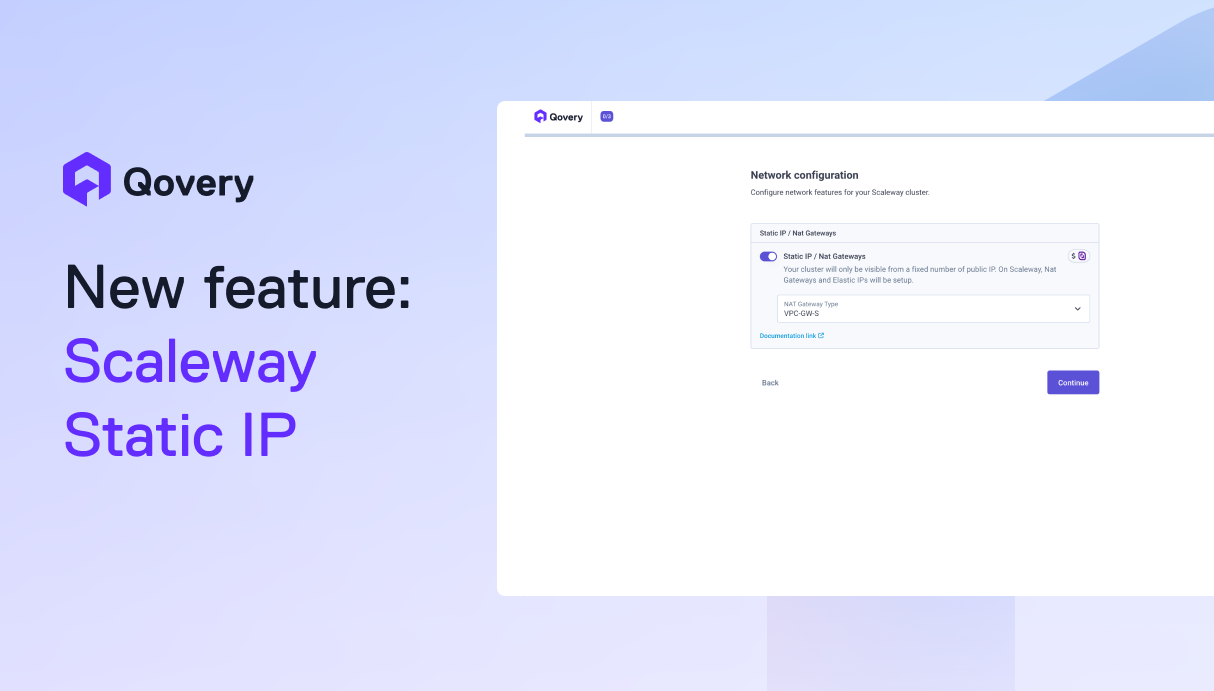Filter app log by deployment, Static IP egress Scaleway, Removing fargate for Karpenter, DevOps Copilot updates
Hey Team,
Before jumping into product updates, a quick highlight from this sprint that lives a bit outside the product itself.
We have fully revamped our documentation. The goal was simple: make it much easier for you to find the information you need, understand how Qovery works, and get started faster.
We reworked the structure, merged product docs with the API and Terraform provider references, and made the whole experience smoother to read.
If you want to take a look, everything is now live here!
Now let’s talk about what shipped this week.
🔎 Retrieve application logs for a specific deployment
Troubleshooting a failed deployment often means navigating a long stream of mixed logs. When something breaks during the application bootstrap, you only want the logs that matter.
You can now filter logs using the deployment_id, which lets you isolate the logs produced by your application during one specific deployment. It removes a lot of noise and helps you get to the root cause much faster.
🌐 Static IP for egress traffic on Scaleway
Some customers rely on strict IP allowlists, but Scaleway clusters were using random public IPs for outbound traffic.
We introduced a Static IP feature that gives your cluster a stable egress IP. Outbound calls are now predictable and compatible with any external service that requires fixed IP authorization.

💸 Reduce AWS cost and simplify your Karpenter setup
We updated the way Karpenter runs on your AWS clusters. Until now, Qovery deployed it on Fargate nodes. It worked well, but it also added cost and complexity.
Karpenter now runs on a dedicated EC2 node group. This simple shift reduces the cost of running Karpenter by around 30 dollars and removes the dependency on Fargate.
You end up with a leaner cluster architecture and a lighter AWS bill without having to change anything on your end.
🤖 Qovery DevOps AI Copilot Updates
It has now been two weeks since we officially released the Qovery DevOps Copilot. Since that day, we have been improving it continuously based on early feedback from our customers. As a reminder, the objective of our Copilot is simple: turn natural language instructions into concrete, automated infrastructure actions, finally turning DevOps into a competitive advantage.
If you want to learn more about what the Copilot can do, we have a dedicated page here. Feel free to reach your CSM if you want to get an early access.
This sprint focused on making conversations smoother, improving understanding, and strengthening safety across all automated actions.
User Experience
- Better error handling with partial responses and clear explanations
- Informational messages when an action is blocked by read only mode
- Better conversational context retention for a smoother and more natural flow
- Typo tolerance for project and environment names
- Improved search to find projects outside the current context
Automation
- Improved auto remediation, allowing to resolve more internal technical issues on its own
- Smarter confirmation requests that help avoid unwanted actions
Want to see more from our Copilot? check this video 👇
🛠️ Minor updates
- DNS Manager - Add support for new record type CAA variant
That’s it for now. We hope to see you at Demo Day, and we can’t wait for you to try out Copilot. As always, let us know what you think.
Talk soon,
The Qovery Team 🚀

.webp)



.svg)
.svg)
.svg)

